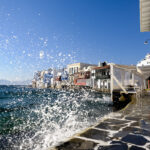As Greece confronts the increasingly tangible effects of climate change, the water crisis that has plagued much of the country now appears to be reaching the heart of Attica. The region, home to nearly half of Greece’s population, is at risk of significant water shortages if this winter fails to deliver the necessary rainfall and snowfall, warns EYDAP, the Athens Water Supply and Sewerage Company.
The prolonged drought has prompted EYDAP to turn to alternative water sources in an effort to safeguard supply for the millions of residents in and around Athens. On Sunday, August 25, Haris Sachinis, EYDAP’s CEO, revealed that the company is now tapping into boreholes in Mavrosouvala, located just north of Mount Parnitha, as well as sources in the broader Attica-Boeotia region. Additionally, reserves from Lake Yliki are being mobilized to prevent the capital’s taps from running dry.
“Water conservation is crucial”
Despite these efforts, Sachinis struck a cautionary note, emphasizing that while EYDAP is closely monitoring the situation, the time for drastic consumption restrictions has not yet arrived. “We have been proactive with a public campaign urging people to reduce water waste,” he explained. “At this stage, we are relying on voluntary compliance, but if the winter is dry, we will be facing a different reality.”
The stakes are high. Over the past two years, an alarming decline in rainfall has drained the region’s water reserves. If the drought persists in the coming years, driven by climate change, Greece will face hard choices. Sachinis noted that the Ministry of Environment and Energy is already exploring alternative solutions, including the construction of new reservoirs, the use of recycled water to replenish underground aquifers, and desalination projects. Still, the public will need to adjust its relationship with water, Sachinis stressed, warning that wasteful practices must cease.
“Prepared for all outcomes”
George Stergiou, chairman of EYDAP, reinforced this message during a radio interview with SKAI 100.3 on the same day. “We are prepared for all possible outcomes of the drought,” Stergiou said, although he was quick to add that the situation has not yet reached a critical tipping point. Nonetheless, Stergiou emphasized the need for heightened public awareness, calling on residents of Attica to avoid using drinking water for non-essential purposes such as washing cars and balconies. “This doesn’t mean a radical change to daily life, but small adjustments are essential,” he urged.
Satellite data exposes drastic water level drops
The concerns raised by officials are backed by worrying satellite data. A recent analysis conducted by the BEYOND Operational Unit of the National Observatory of Athens (NOA) reveals steep declines in water levels at some of Greece’s most critical reservoirs. Notably, the Mornos Reservoir in Central Greece, which serves as the primary water source for Athens, and the Aposelemis Dam in Crete have both seen significant reductions in surface area compared to 2022. Using imagery from the European Space Agency’s Sentinel-2 satellites, BEYOND detected a decrease of approximately 4,700 acres at Mornos and 600 acres at Aposelemis over the past two years.
Climatebook, a project tracking climate change through satellite data, corroborates these findings. In early July 2023, satellite images showed that the surface area of Lake Mornos had shrunk to about 16.5 square kilometers. By late June 2024, the lake had contracted even further, to around 12.8 square kilometers—a reduction of 15-20% compared to average levels observed since 2010.
These figures are sobering. Mornos, which plays a pivotal role in Athens’ water supply, is now at its lowest recorded level since satellite monitoring began. With water reserves nearing 700 million cubic meters, the situation is becoming increasingly precarious.
Experts warn of an impending crisis
The scientific community is sounding the alarm. Hydrologist Maria Mimkou warned that without significant rainfall, Mornos could reach a critical point within the next two years. “We’re already nearing the edge. If we continue as we are, and the drought persists, we will need to take serious measures to conserve water, particularly for agricultural use,” she cautioned. Currently, around 80% of Greece’s water consumption is allocated to agriculture, a figure that is increasingly unsustainable as water becomes scarcer.
Mimkou’s concerns extend beyond Attica. The artificial Lake Pineios in the Peloponnese region has also experienced a dramatic contraction due to the prolonged drought, unseasonably high temperatures, and a mild winter with little snow. According to Climatebook, the lake’s surface area shrank from 16.6 square kilometers in July 2023 to just 9.8 square kilometers by July 2024. This marks a 35-40% reduction compared to the average size recorded since 2010.
A growing crisis demands urgent action
Greece’s water crisis is a microcosm of the broader challenges posed by climate change across the Mediterranean. With rising temperatures and shifting weather patterns, the country is facing an uncertain future in which water scarcity may become a permanent fixture of life. While EYDAP and other agencies are exploring long-term solutions like desalination and reservoir construction, these measures will take time to implement and may not be enough to offset the immediate threat.
The message from officials and scientists alike is clear: water conservation must become a top priority. Public awareness campaigns can only go so far—ultimately, the solution will depend on collective action and a fundamental shift in how water is valued and used. The time to act is now, before Greece faces a crisis that could have been averted.





